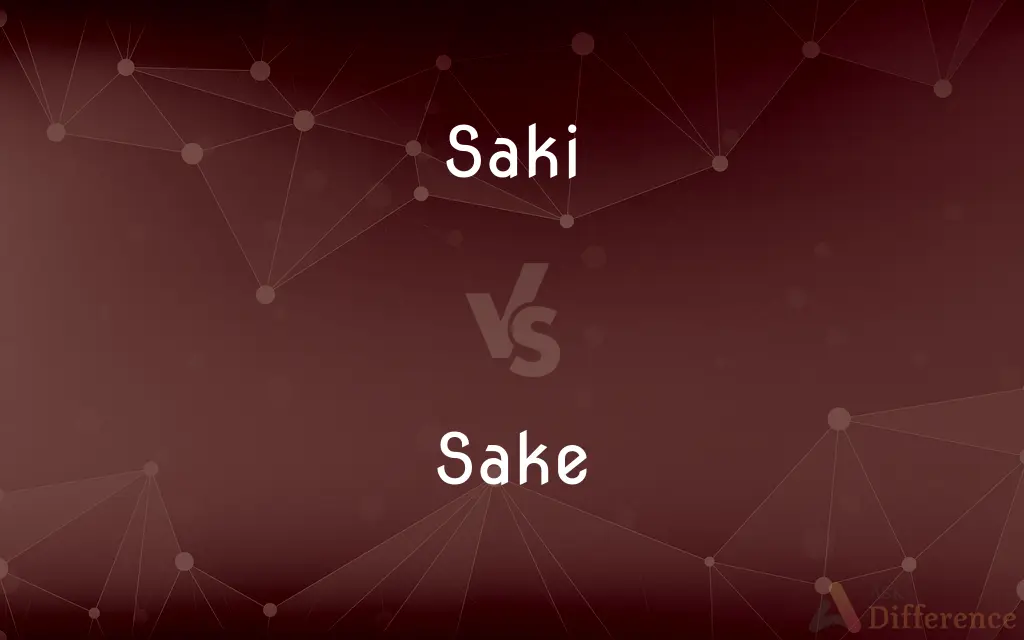Saki vs. Sake — What's the Difference?

Difference Between Saki and Sake
ADVERTISEMENT
Compare with Definitions
Saki
Hector Hugh Munro (18 December 1870 – 14 November 1916), better known by the pen name Saki and also frequently as H. H. Munro, was a British writer whose witty, mischievous and sometimes macabre stories satirize Edwardian society and culture. He is considered by English teachers and scholars as a master of the short story, and often compared to O. Henry and Dorothy Parker.
Sake
Sake, also spelled saké ( SAH-kee, SAK-ay, also referred to as Japanese rice wine), is an alcoholic beverage made by fermenting rice that has been polished to remove the bran. Despite the name Japanese rice wine, sake, and indeed any East Asian rice wine (such as huangjiu and cheongju), is produced by a brewing process more akin to that of beer, where starch is converted into sugars which ferment into alcohol, whereas in wine, alcohol is produced by fermenting sugar that is naturally present in fruit, typically grapes.
Saki
Variant of sake2.
Sake
Purpose; motive
A quarrel only for the sake of argument.
Saki
Any of several small omnivorous arboreal monkeys of the genera Pithecia and Chiropotes of northern and central South America, having long legs and a long bushy nonprehensile tail.
ADVERTISEMENT
Sake
Advantage; good
For the sake of his health.
Saki
Any of several species of South American monkeys of the genus Pithecia. with large ears and a long hairy tail that is not prehensile.
Sake
Personal benefit or interest; welfare
For her own sake.
Saki
Any one of several species of South American monkeys of the genus Pithecia. They have large ears, and a long hairy tail which is not prehensile.
Sake
A Japanese alcoholic beverage made from fermented rice.
Saki
The alcoholic drink of Japan. It is made from rice; it is usually spelled sake.
Sake
Cause, interest or account
For the sake of argument
Saki
British writer of short stories (1870-1916)
Sake
Purpose or end; reason
For old times' sake
Saki
Japanese alcoholic beverage made from fermented rice; usually served hot
Sake
The benefit or regard of someone or something
Saki
Small arboreal monkey of tropical South America with long hair and bushy nonprehensile tail
Sake
Contention, strife; guilt, sin, accusation or charge
Sake
Final cause; end; purpose of obtaining; cause; motive; reason; interest; concern; account; regard or respect; - used chiefly in such phrases as, for the sake of, for his sake, for man's sake, for mercy's sake, and the like; as, to commit crime for the sake of gain; to go abroad for the sake of one's health.
Moved with wrath and shame and ladies' sake.
I will not again curse the ground any more for man's sake.
Will he draw out,For anger's sake, finite to infinite?
Knowledge is for the sake of man, and not man for the sake of knowledge.
Sake
A traditional alcoholic drink of Japan. It is made from rice.
Sake
A reason for wanting something done;
For your sake
Died for the sake of his country
In the interest of safety
In the common interest
Sake
Japanese alcoholic beverage made from fermented rice; usually served hot
Sake
The purpose of achieving or obtaining;
For the sake of argument
Share Your Discovery

Previous Comparison
Digit vs. Finger
Next Comparison
Deposit vs. Caution













































